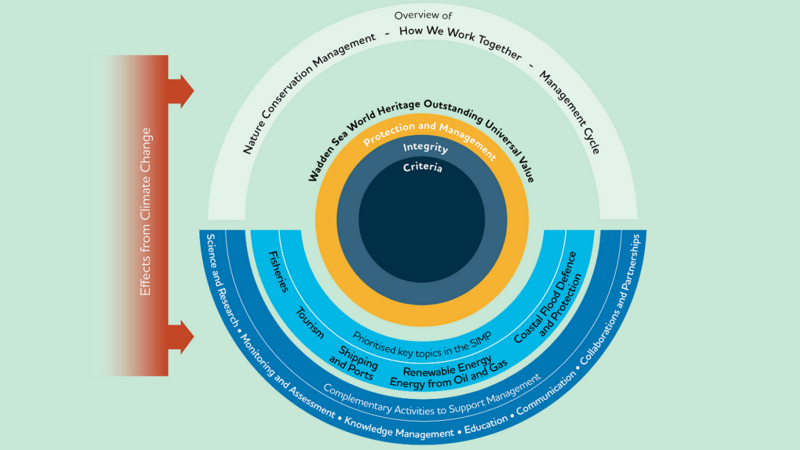Milestone document “The SIMP – Integrated Management Plan for ONE Wadden Sea World Heritage” adopted

The Trilateral Wadden Sea Cooperation (TWSC), with the Wadden Sea Plan (2010) at its backbone, operates to conduct a shared policy and management strategy for the protection and sustainable management of the area, with the imperative of safeguarding its Outstanding Universal Value (OUV). This aspect is reinforced by “The SIMP – Integrated Management Plan for ONE Wadden Sea World Heritage”, formally adopted with the signing of the Wilhelmshaven Declaration concluded on the 15 of May, in the framework of the 41st meeting of the Wadden Sea Board in Esbjerg, Denmark. The SIMP functions as an umbrella plan to serve as a guide for all aspects of the transnational Wadden Sea World Heritage Site and complements the Wadden Sea Plan (2010), which contains the trilaterally agreed targets and policies. With the development of the SIMP, the TWSC meets the official request made by UNESCO’s World Heritage Committee in 2014.
The SIMP demonstrates the nature conservation structures in the three countries and their trilateral joint efforts. As a non-binding political agreement, and under the roof of trilateral dialogue, the SIMP operates with the purpose of exploring common grounds and improving coherence in transboundary management tasks and activities for the OUV’s protection and maintenance. “As each Wadden Sea country represents a different contribution to cooperation, with the plan, we seek to acknowledge and use the combined capabilities of the three parties to collectively respond to common relevant issues and continue the long-term protection of the Wadden Sea,” says Dr Soledad Luna, SIMP Programme Officer at the Common Wadden Sea Secretariat.
Fulfilling the SIMP calls for coordinated dialogue, research, and a deep understanding of the responsibility of maintaining the Wadden Sea for its global importance. Working towards common nature conservation goals, the SIMP is important for the enhancement of the exchange of good practices, knowledge, and experience between site managers through joint activities and efforts to expand the scope of cooperation at different levels. By establishing a valuable framework for strategic communication and cooperation via the implementation of the SIMP, trilateral groups, as well as site managers, policy makers, relevant institutions, and stakeholders, can identify and address existing and future issues as well as establish greater cohesion.
The plan was developed in an iterative and participatory way in the TWSC, including policy and nature conservation site management levels transnationally. The Task Group World Heritage oversaw the overall process of development of the SIMP, including the participation of TWSC groups, site managers, and experts. Consultation was also received beyond the TWSC structure: external stakeholders and members of advisory boards in each of the German Federal States, Denmark, and the Netherlands reviewed and commented on the draft SIMP, as well as the Wadden Sea Forum of stakeholders, and the Wadden Sea Team of environmental NGOs at the trilateral level. “These rounds of consultation with diverse partners really improved the plan’s ambition level, readability, and clarity, for which we are immensely thankful”, says Barbara Engels, chair of the Task Group World Heritage.
The SIMP will be revised regularly by the Wadden Sea Board (WSB) to keep its operational nature up-to-date. A progress report every four years prior to the Ministerial Declaration and a review cycle of 10-12 years are foreseen. The four-year report gathers the progress made trilaterally and by each country in implementing the SIMP activities. The 10-12-year review presents an opportunity to adapt the SIMP to the management requirements of the TWSC, including the selection of key topics, with the support and participation of all parties involved in implementing the plan.
The identification of common objectives, risks, and challenges makes national efforts more closely aligned and coherent. Five key topics lie at the heart of the SIMP: fisheries; tourism; shipping and ports; renewable energy and energy from oil and gas; and coastal flood defence and protection. The SIMP recognises these as important socio-economic factors in the region for their contribution to preserving jobs, ensuring food security, providing erosion and coastal flooding protection, supporting maritime trade and transport, and providing energy. However, when interlinked, pressures from the key topics and climate change can come with an altering cost for the environment, despite existing regulatory protection regimes. Set in the context of interdisciplinary cross-sectoral exchange, the key topics’ activities are grounded on the trilateral exchange of knowledge and best practices, awareness raising, and advocacy.
At the base are the key complementary activities to support management in the Wadden Sea: Science and Research, Monitoring and Assessment, Knowledge Management, Education for Sustainable Development and Interpretation, Communication as well as Collaboration and Partnerships. The SIMP aims to contribute to strengthen these by building on and improving the use of the related existing plans, strategies, and frameworks, which makes conservation efforts more closely aligned and coherent.
>>> Read full SIMP (translations in Danish, German and Dutch will be available in the coming months)
